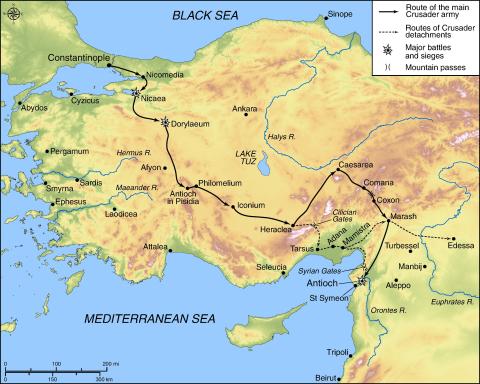The Road to Antioch
[4.10.7] Ortā autem diē, vēnērunt māiōrēs cīvitātis, et reddidērunt sponte cīvitātem, dīcentēs illīs quī super hoc lītigābant adinvicem: “Sinite modo seniōrēs, sinite, quia volumus et petimus dominārī et rēgnāre super nōs illum quī heri tam virīliter pugnāvit cum Turcīs.” Balduīnus itaque mīrificus comes altercābātur et lītigābat cum Tancredō dīcēns: “Intrēmus simul et spoliēmus cīvitātem, et quī plūs potuerit habēre, habeat, et quī poterit capere, capiat.” Cui Tancredus fortissimus dīxit: “Absit hoc ā mē. Ego namque Chrīstiānōs nōlō expoliāre. Hominēs hūius cīvitātis ēlēgērunt mē dominum super sē, mēque habēre dēsīderant.” Tandem nequīvit vir fortis Tancredus diū luctārī cum Balduīnō comite, quia illī magnus erat exercitus; tamen, volēns nōlēnsque, dīmīsit eam, et virīliter recessit cum suō exercitū; fuēruntque eī statim trāditae duae optimae cīvitātēs, vidēlicet Athēna et Manustra, et plūrima castra.
notes
(September 1097) The leaders of the city offer it to the crusader most responsible for defeating the Turks. But Tancred and Baldwin still cannot settle the dispute, and because Baldwin’s army is much larger Tancred is forced to leave.
super hoc: “over this business, this affair,” referring to the dispute between Tancred and Baldwin in the preceding paragraph.
volumus et petimus ... cum Turcīs: = volumus et petimus illum, quī heri tam virīliter pugnāvit cum Turcīs, dominārī et rēgnāre super nōs.
ēlēgērunt mē dominum: dominum is predicate accusative.
illī magnus erat exercitus: dative of possession; illi = Balduino.
tamen: tamen (ML) = itaque (CL).
volēns nōlēnsque: “willy-nilly.”
dīmīsit eam: "he (Tancred) let the city go."
fuēruntque eī statim trāditae: to Tancred.
Athēna: modern Adana. The Roman bridge across the Seyhan river survives (see media).
Manustra: Ancient Mopsuestia, modern Mamistra.
vocabulary
litigō (1): to quarrel (OLD 2.)
adinvicem: with one another
sinō sinere sīvī (sīi) situm: to let a thing pass (OLD 2); (imperat.) never mind!
modo: at this time (ML); just, now (CL)
dominor (1): to rule
luctor (1): to contend, struggle
dīmittō dīmittere dīmīsī dīmissum: to leave (OLD 4)


